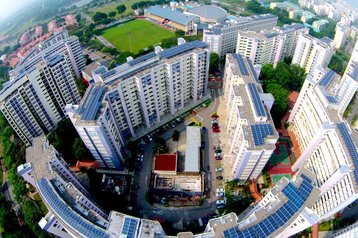Microsoft has agreed to buy the output of a new 60MWp (megawatt-peak) solar project in Singapore. The deal with Sunseap Group is the largest-ever solar project in the country and Microsoft’s first clean energy deal in Asia.
The Sunseap project is distributed on hundreds of rooftops across the nation-state, which will agree to host the panels, and export the generated energy to the national grid. Microsoft has signed a 20-year agreement to purchase 100 percent of the renewable energy from the project to power its Singapore data center, which delivers a variety of cloud services including Microsoft Azure and Office 365.
Tropical sun
Back in 2014, the Singapore government embarked on a long-term plan to establish itself the dominant player in green IT, at the same time as it has been developing as an international digital hub.
However, lack of renewable energy has been a drawback. Wind and hydropower is limited there, and though Singapore’s tropical climate could generate a lot of solar electricity, there is very little land available for large-scale solar farms.
The country currently gets the majority of its power from natural gas, and less than two percent (130MWp) comes from solar. Singapore has a target of five percent (350MWp) by 2020, according to the Straits Times.
The country could go way beyond this and get a quarter of its energy from solar by 2025, according to a 2017 white paper by the Sustainable Energy Association of Singapore (SEAS) quoted by Deputy Prime Minister Teo Chee Hean . To do this would require it to double output every two years.
In 2016, looking for somewhere to put the solar panels this would require, Singapore launched the world’s largest floating solar solar energy test-bed, which could potentially be replicated in the 17 reservoirs that make up a significant part of the country’s surface area.
To help with green data centers, Singapore’s Info-communications Media Development Authority (IMDA) is currently conducting trials of the world’s first data center for tropical climates. Last year, it also kicked off a government-back project to study the technical feasibility of a green, high rise facility.
Hope for the cloud
Like other cloud players, Microsoft has promised to adopt more renewable energy. It has also said it wants to go beyond the practice of buying carbon credits, funding and using renewable energy directly. By fuelling Microsoft’s Singapore data center, this deal goes some way towards that. The deal offers hope for technology companies who need to be in Singapore because of its role as a global technology hub, without missing their sustainability goals.
“Our cloud services are helping to power Singapore’s digital transformation, and today’s agreement will ensure that transformation is increasingly powered by clean energy,” said Kevin Wo, the managing director of Microsoft Singapore. “With the agreement, Microsoft will improve the sustainability of our local operations and make important progress toward our corporate sustainability goals for data centers.”
“[Microsoft’s] investment in Singapore solar indicates a growing momentum for clean energy in the country and will further the positive ripple effect for organizations in Singapore to incorporate sustainability practices in their businesses” said Lawrence Wu, co-founder and president of Sunseap in a statement.
Microsoft says it is on track to exceed a goal of powering half of its global data center load with renewable energy this year. “Once operational, the new solar project will bring Microsoft’s total global direct procurement in renewable energy projects to 860 megawatts,” said Christian Belady, the general manager of cloud infrastructure and architecture at Microsoft.
“This landmark agreement marks yet another milestone in Singapore’s journey to grow the clean energy industry. We are seeing a distinctive trend of local and foreign companies using up to 100 percent renewable energy to power their business operations, and Singapore is positioning itself to serve that need,” said Gian Yi-Hsen, the executive director of Cleantech at the Singapore Economic Development Board (EDB).
“EDB welcomes this latest agreement between Microsoft and Sunseap, which will help proliferate adoption of clean energy, and spur further innovation in new business models and technologies,” said Gian.

